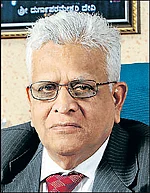
It is said that India produces over six to eight lakh technical graduates annually. However, research studies show that only 25 per cent of them are career ready and employable by the industry. A vast majority of technical graduates are deficient in communication skills, analytical/problem solving capabilities, learning abilities, process orientation and domain skills. It is, therefore, necessary to find out the main causes for this growing problem of unemployability of our graduate and post-graduate students.
Although we tend to consider higher education system as the main defaulter in churning out unemployable graduates, the traits of employability among the students actually are sown early in the school education stage and are fairly hardened by the time they get into the higher education system. Hence, it is felt necessary that all the stakeholders such as industry, academia, government need to introduce measures to enhance talents at the basic stage in career management so as to ensure that the students have the required skill sets when they complete their graduation. Industry, in collaboration with academic institutions and faculty, have to orient a curriculum that instils the requisite skills in the students.
The lack of effective industry academia interaction has been one of the failings of the Indian knowledge ecosystem. An overwhelming majority of students go into the employment markets armed with only educational qualifications. Ensuring their employment is a responsibility which industry and academia need to address together. This can be done by training faculty to deliver appropriate content in innovative ways since they impact multiple batches of graduating students. Faculty development and training programmes with a module for judging/testing them on their ability to impart the requisite skills become very critical.
Quality consciousness
The government is an important and crucial player in employability. While the government has focused on increasing the quantity of technical graduates in the country, it is time to start focusing on improving the quality of such graduates. One of the important initiatives taken by the government in collaboration with educational institutions is ‘finishing schools’. Finishing schools work towards enhancing employability by training graduates on specific skill sets required by industry. In the long term, the finishing school mechanics should be embedded into the curriculum itself and institutions should be measured on how they fare on attributes like employability, besides scholastic achievements.
Active learning
Technical graduates of tomorrow need to rapidly develop and integrate the right way of conceptual and procedural knowledge required to articulate, design, develop and implement solutions to real world challenges. This requires infusing several competencies within subjects. Autonomous institutions and deemed universities which have academic flexibility in curriculum changes, conducting assessments and evaluations are beginning to align education programmes with future workplace demands. There are many real world engineering practices being considered in today’s electives. Educational institutions see a good reason in having industry electives because it enhances employability and also creates competitiveness among the institutions of excellence.
From the perspective of employability, the gap between learning practices and business expectations in terms of preparing technical students is significant. The resulting educational gaps have important performance related implications both for industry and higher education institutions. One of the solutions appears to be active learning. Active learning shifts the attention from the teacher to the learner. It emphatically subscribes to the idea that learners take equal learning responsibility in the entire learning cycle. Active learning means participating in events which are facilitated rather than taught. Such training involves people’s behaviour, as distinct from their capacity to remember.
There is a need that modern day education system recognises and emphasises
the importance of innovative and co-operative learning methods like case studies, role-plays, demonstrations, debate and so on in the teaching learning process. Each of these are aimed at encouraging learners to participate in the learning process and go beyond memorising sections of texts. In fact, the stress here is on thinking and implementing rather than rote learning.
There are other entities like assessment agencies, training organisations that facilitate interaction and work towards creating a platform where all stakeholders, including students, can come together and explore opportunities of reducing the gap between the supply and demand of the talent pool. The students through these catalysts can identify their skills and abilities, their strengths and weaknesses and areas of improvement. This feedback then becomes very crucial in assisting them to train themselves on the requisite skills and become career ready.
(The writer is president of Indian Society for Technical Education and former vice chancellor of Bangalore University.)

